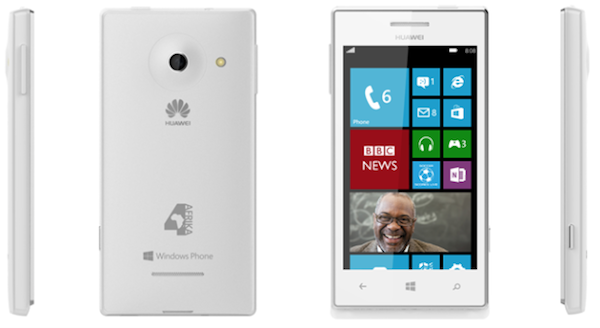Huawei 4Afrika Microsoft Windows Phone Debut


In an attempt to capitalize on an exploding market, Microsoft has partnered with Huawei to bring low-cost Windows smartphones to Africa.
The two companies announced yesterday that they’re partnering to develop a new smartphone for the consumer market in Africa. The continent has one of the fastest growing personal electronics markets in the world, the biggest after Asia, and supports approximately 821 million subscribers. However, most subscribers are still using feature phones (one particular carrier refers to these as ‘smartphone lite’).
The President of Microsoft International, Jean-Philippe Courtois, said yesterday that, “We believe there has never been a better time to invest in Africa and that access to technology — particularly cloud services and smart devices — can and will serve as a great accelerator for African competitiveness…“
Analysts have shown that Africa is a serious market for growth indeed. ABI expects that the mobile market in Africa will grow to 1.12 billion subscribers by 2017, making it 13.9 percent of the overall world market.
Microsoft and Huawei’s new phone, Huawei 4Afrika, will be the very first in a set of devices currently being developed for the area. The device is expected to become available in Angola, Egypt, Ivory Coast, Kenya, Morocco, Nigeria, and South Africa later this month.
The phone comes packed with custom apps developed for the African market. It has a dual-core 1.2 GHz Snapdragon processor, a 4-inch 480 x 800 resolution display, both front and rear facing cameras, and 4GB of internal storage. It’s estimated than the device has 420 hours of standby time due to a unique power saving technology. According to The New York Times, the Huawei 4Afrika will cost $150 when it debuts.
Windows phones aren’t new to the African market. HTC, Nokia, and Samsung devices are all part of the current competition, but Microsoft is leveraging their position to help support the company’s 4Afrika Initiative. Microsoft has partnered with Nokia to provide a customer training program designed to accelerate adoption of the Nokia Lumina 510 and 620 devices. The 4Afrika Initiative is primarily targeting middle-class demographics including educators, students, and small businesses. Microsoft estimates that by 2016, the campaign will have distributed “tens of millions” of smartphones to African youth and connected nearly 1 million small and mid-sized businesses online. From ABI’s growth rate statistics and existing numbers, that isn’t a very hard pill to swallow.
Furthermore, the 4Afrika Initiative is supporting the development and delivery of low-cost, high-speed wireless broadband to some locations that don’t even have basic electricity yet. Paul Garnett, Microsoft’s Director of the Technology Policy Group, and Louis Otieno, their Legal and Corporate Affairs Director for Africa Initiatives, said, ” Using the latest Windows 8 tablets, Windows 8 applications and Office 365, project partner Indigo is providing computer labs and offering instruction at each school. The agricultural extension office in Kalema will also receive the Office 365 suite of services to help accelerate economic development in this largely agrarian community. Finally, the project partners are also working with both community leaders and Kenyan content providers to identify the most-needed services and applications for each location and develop Windows 8 applications focused on education and agriculture.
This news coming in just two weeks after Mozilla’s partnership announcement with Geeksphone and Telefonica to bring low-cost handsets to, initially, Brazil. It seems manufacturers aren’t wasting time tapping into markets that were previously inaccessible. With this project, Microsoft will have a better chance at gaining a much larger share of the smartdevice market. It’s projected by ABI that by the end of this year Windows OS devices will only account for about 3.2 percent of the global market, with Apple’s iOS leading in tablets and Android leading in smartphones.
[Image via Microsoft]









































